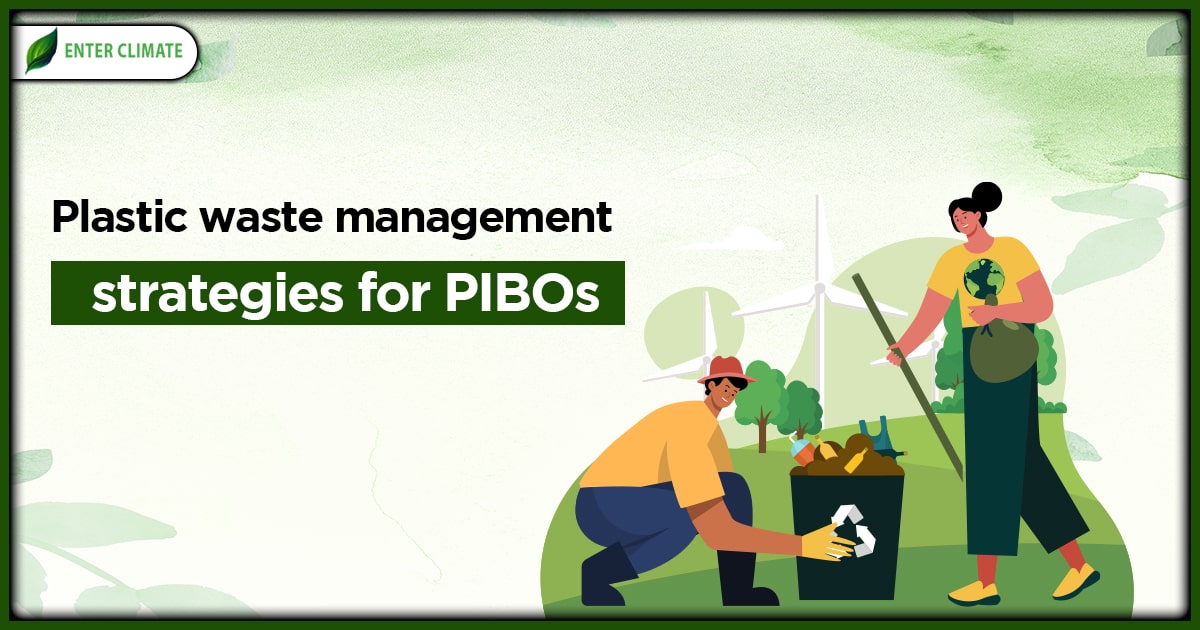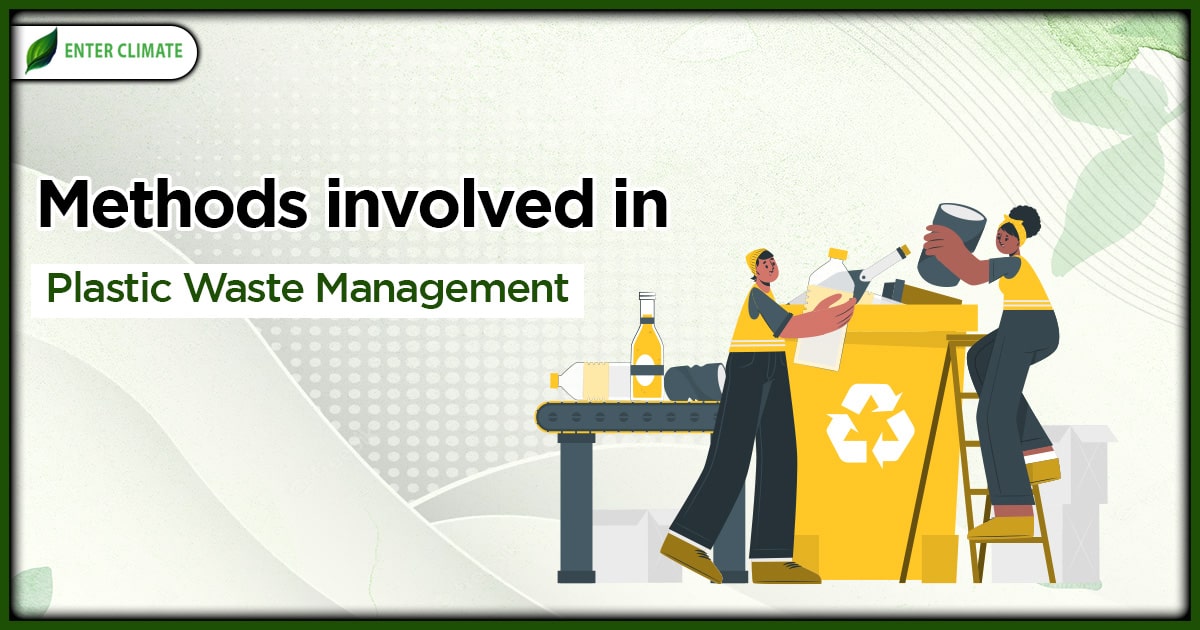Plastic waste management strategies for PIBOs
 29 Sep, 2023
29 Sep, 2023 
Packaging is one of India’s most important plastic materials applications today. This is because of the many unique qualities of plastic, such as its inter nature, cost-effectiveness and cheap and easy manufacturing process. These advantages have resulted in an economy wherein plastics are becoming a significant part of today’s manufacturing sector. But there is a downside, too. Indiscriminate plastic usage and long-term ignorance of the waste management aspect have led to plastic waste becoming the most dangerous pollution issue the world is facing today. The waste management issues associated with plastic and environmental degradation have led to organisations shifting their focus to better waste management strategies. In this article, we will be looking at some of these popular plastic waste management strategies.
Issues with Plastic Waste Management in India
For a business dealing with plastic packaging and wanting to implement better Plastic waste management strategies, it is important to understand the harmful effects which the poor management of plastics can cause.
Non-biodegradability and poor plastic waste management can cause a series of environmental hazards to the safety and choking of drains in urban cities and other production areas. The Waste disposal problems associated with plastic packaging are
- Unscientific collection, segregation and treatment/ recycling of plastic waste
- Waste Management in the unregulated informal sector.
- Production of packaging material from virgin plastic instead of reprocessed or recycled plastic.
How should PIBOs design their Plastic Waste Management Strategies?
Identifying the Problem
The responsibility to adopt circular economy principles and minimise waste and pollution generation lies with the Producers, importers and Brand owners (PIBOs) that use plastic packaging. Extended Producer Responsibility or EPR Obligations have been added under the Plastic Waste Management Rules, 2016 and have defined the legal responsibilities of PIBOs w.r.t plastic waste management.
FMCG Products like bread, rice, snacks, juices, spices, milk, oil, flour, confectioneries, etc., use plastic packaging of different categories. Pharmaceutical and Cosmetic products are also responsible for a huge chunk of plastic packaging waste generation.
Bulk consumers of plastic packaging can easily be identified, and proven waste management strategies can then be made available by streamlining the process. The existing informal sector can play a crucial role in this regard.
Analysing the life cycle of Plastic Packaging: To identify the perfect strategies, one needs to identify and summarise the lifecycle of plastics according to their categories, including polystyrene or styrofoam (PS), polyvinyl chloride (PVC–U), polypropylene (PP), polyethylene terephthalate (PETE), high-density polyethylene (HDPE) and others. This categorisation should touch on aspects like thermoplasticity, mouldability, molecular structure, life span, reactivity, etc.
Finding alternatives: An alternative to plastic must be able to mimic the unique characteristics of plastic, such as its versatility, hygienic nature and cost-effectiveness. Producers and brand owners are responsible for waste management as their products generate a huge amount of pre and post-utilisation plastic waste. Finding suitable alternatives to plastic packaging becomes their added responsibility. Investing in R&D will also help PIBOs effectively meet plastic waste management obligations in the long run and open new opportunities for growth and innovation in the recycling sector.
Analysis of Applicable Regulation: The production and use of plastic and plastic packaging by humans for personal or commercial purposes is being regulated by the Plastic Waste Management Rules, 2026 and its amendment thereafter. In 2022, the EPR Guidelines for PIBOs were announced, which are also crucial as they discuss permissible plastic waste management methods. Plastic waste management strategies also include the disposal methods of plastic in the form of c0-processing or for RDFs, which must be the last resort. In addition to this, the percentage of plastic that can be sent for disposal by PIBOs is also being regulated. Therefore, PIBOs should avoid unnecessary packaging and labelling material, and an eco-friendly alternative to plastic should encouraged.
Applying Identified Strategies: When the PIBO has identified the most suitable waste management strategy or a combination of strategies that suits their EPR objectives and EPR Targets, the strategies can be implemented with the assistance of waste management agencies, Urban Local bodies or their own recycling infrastructure. However, when the PIBOs engage with any king recycling/ co-processing or RDF facility, they must ensure that entities are registered and comply with EPR regulations applicable to them.
Examples of Plastic Waste Management
Reprocessing: Reprocessed plastic is recovered from plastic waste in the form of plastic granules. This is the most effective and profitable way of Plastic waste management strategy. Reprocessing plays an important role in meeting the demand for plastic products. A lot of waste plastic from milk sachets, liquor covers, tobacco covers, packaging covers, broken buckets, tubs, mugs, etc., is available in large quantities. Compounding, a reprocessing technique, involves smashing and melting plastic particles to create pellets. This process is also called extrusion. Reprocessed plastic granules are used to make carry bags, packing covers, buckets, mugs, etc. Hence, there is a good scope to reprocess used plastic waste to produce granules, subject to guidelines laid down in the Environment (P) Act.
Advanced Recycling
Advanced recycling is a process in which the effect of chemicals and biological agents breaks down plastic waste.
This method can further be classified into three:
- Pyrolysis (technique that involves recycling plastic waste into crude oil)
- Chemical recycling
- Gasification (converts plastic to gas, which is then used to create energy.)
- Biological recycling: Organisms in water or soil, like microbes, fungi, bacteria and worms, can break down some plastic polymers. After this process is complete, the only by-products are heat, CO2 and water vapour, with some parts being converted from organic carbon into humus.
Incineration: As plastic is prepared from petroleum or natural gas, plastics have an energy value greater than any other material. Plastics produce heat when they are burned. However, incinerating plastics negatively affects the air and the environment and must be avoided by PIBOs as their preferred plastic waste management strategy. It also affects our well-being, as hazardous substances get released into the atmosphere. For example, incineration of plastic if done by mixing with PVC or halogenated additives, can lead to a release of polychlorinated-biphenyls and dioxins[1] into the environment. Thus, incineration has pros and cons and should be used cautiously.
Using Biodegradable Plastic: This category of plastic can be decomposed by the action of living organisms as they are commonly produced with raw materials that are renewable. Biodegradable plastics are commonly used for manufacturing disposable items, such as packaging, crockery, cutlery and food service containers. Biodegradable plastics can solve multiple issues related to plastic waste management.
Use of Waste Management Equipment. In case the PIBOs want to manage plastic waste effectively, using recycling equipment is the key. Technologically advanced equipment like shredders, balers, compactors and trash cutes can efficiently process plastic waste. This makes it easier to recycle and dispose of the plastic waste properly. Many turnkey machines are available in the market that can handle all kinds of plastic waste and assist PIBOs in their Plastic waste management strategies.
Implementing Minimum Waste Generation Technology: ManyBrand owners in the plastic packaging industry benefit from using innovative methodologies and technologies. If you are a business owner in this plastic packaging industry, it becomes crucial to prioritise your plastic waste management strategies using the latest machinery that can help you reduce plastic waste. PIBOs can opt for equipment that creates maximum plastic parts with minimal leftover scraps.
Reduce the use of virgin plastic. PIBOs can switch to metal containers or drums instead of spending on plastic. Similarly, using bulk packaging whenever possible to minimise waste. Combining orders into the same container is an effective way to reduce one’s waste footprint.
Besides the above-mentioned pointers, Plastic waste management strategies can also include
- Minimising the use of single-use plastic items and replacing them with biodegradable alternatives.
- Promoting the use of reusable bags made of cloth, jute and other biodegradable materials instead of plastic bags.
- Creating awareness about the benefits of source segregation of plastic waste.
Conclusion
About 40% of plastic materials worldwide are used to stock and package finished products from different factories. India’s plastic demand has also grown substantially and reached 20.89 million tonnes in 2021-22. This demand is further projected to continue growing to 22 million tonnes by the end of 2023. Our increasing reliance on landfilling all kinds of waste without segregation is harming at an accelerated pace. Plastic disposal and its decomposition in landfills lead to the mixing of pollutants such as microplastic into the soil and surrounding waterbodies. Public awareness must be created regarding the recycling of plastic. The assistance of environmental experts can help PIBOs develop effective plastic waste management strategies and prove profitable steps in the long run.
FAQs
Extended producer responsibility or EPR is a waste and pollution management concept introduced under the Plastic Waste Management Rules 2016 that encourages companies to design more sustainable and recyclable products and manufacturing processes.
Extended Producer Responsibility or EPR is a waste management concept where the producer, brand owner, and importers of products that use plastic packaging have to bear the responsibility for the management of waste from their products throughout the product lifecycle.
As per the EPR Registration outlined in the PWM Rules, Producers, importers, and brand owners using Plastic packaging are responsible for registering themselves with the centralised CPCB portal and take responsibility for plastic packaging waste generated by their product through recycling, re-use, or end-of-life disposal.
PIBOs operating in one or two states/UTs will have to register with the respective State Pollution Control Boards (SPCB/PCC) and the registration on the CPCB portal.
PIBOs must ensure that the equivalent quantity of plastic waste generated by their product is processed through Plastic Waste Processors (PWPs) according to the action plan submitted by the PIBO in order to meet assigned EPR targets.
PIBOs must obtain a PWP certificate from plastic waste processors based on the amount of plastic waste processed by PWPs and use the PWP/ EPR certificates to fulfil their EPR targets. If any PIBO fails to comply with EPR obligations, environmental compensation, as well as disciplinary action, can be imposed on the defaulting entities.
Read our Article: Methods Involved In Plastic Waste Management













